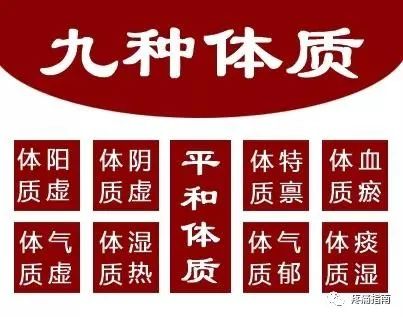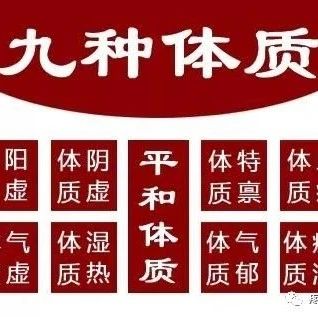
Click↑ Follow us in blue!
Traditional Chinese Medicine (TCM) body constitution theory primarily determines the differences in individual constitutions within populations based on fundamental theories of TCM such as Yin-Yang, Five Elements, organs, essence, Qi, blood, and body fluids. The specific classification methods include Yin-Yang classification, Five Elements classification, organ classification, body shape classification (fat and thin), and temperament classification (brave and timid).

1. Methods of Body Constitution Classification

TCM uses the theory of Yin-Yang to explain the laws of life movement, addressing issues of health and disease. Therefore, TCM primarily classifies body constitutions based on physiological functional characteristics using Yin-Yang theory. This section adopts the Yin-Yang classification method for body constitution. It should be noted that the terms used in body constitution classification such as Yin deficiency, Yang deficiency, Yang excess, phlegm-dampness, spleen deficiency, and liver excess are different concepts from the syndrome names used in syndrome differentiation and treatment, reflecting individual specificity that exists even in a non-disease state.
Balanced Constitution
“The body is strong, appetite is good,” along with good sleep, a cheerful personality, and strong adaptability to society and nature, is a typical balanced constitution. Individuals with this constitution are less prone to illness.
Maintenance methods: Avoid overeating or hunger, do not consume excessively cold or hot foods. Eat more grains, vegetables, and fruits, and less greasy and spicy foods. For exercise, young people can choose running or playing ball, while the elderly should engage in moderate walking or Tai Chi.
Qi Deficiency Constitution
Weak speech, frequent spontaneous sweating, shortness of breath, and constant fatigue characterize the Qi deficiency constitution. Such individuals are prone to colds, have weak resistance to illness after falling sick, and may suffer from organ prolapse, such as gastric ptosis.
Maintenance methods: Eat more foods that tonify Qi and strengthen the spleen, such as soybeans, white lentils, shiitake mushrooms, jujubes, longan, and honey. Engage in gentle exercises like walking or Tai Chi, and regularly massage the Zusanli (足三里) point. Those with spontaneous sweating or frequent colds may take Yu Ping Feng San (玉屏风散) for prevention.
Damp-Heat Constitution
Oily skin on the face and nose, prone to acne and sores, and foul breath characterize the damp-heat constitution. Such individuals also experience sticky stools and yellow urine.
Maintenance methods: Maintain a light diet, eating more cooling and neutral foods like mung beans, water spinach, amaranth, celery, cucumber, winter melon, lotus root, and watermelon. Avoid spicy and warming foods. Refrain from smoking and drinking alcohol. Avoid staying up late and excessive fatigue. Suitable exercises include middle-distance running, swimming, hiking, and various ball games. Regularly take Liu Yi San (六一散), Qing Wei San (清胃散), or Gan Lu Xiao Du Dan (甘露消毒丹).
Yin Deficiency Constitution
Individuals who are sensitive to heat, often feel heat in their palms and soles, have flushed cheeks, dry skin, dry mouth, and are prone to insomnia and constipation have a Yin deficiency constitution.
Maintenance methods: Eat more cooling and moistening foods, such as mung beans, winter melon, sesame, and lily. Avoid warm and drying foods. Maintain a proper midday rest. Avoid staying up late and intense exercise, controlling sweating during workouts and replenishing fluids in time. Consider taking Liu Wei Di Huang Wan (六味地黄丸) or Qi Ju Di Huang Wan (杞菊地黄丸) as needed.
Qi Stagnation Constitution
Individuals with a sentimental, melancholic, and fragile Qi stagnation constitution are generally thin, often feel gloomy, sigh without reason, and are prone to palpitations and insomnia.
Maintenance methods: Eat more foods that promote Qi circulation, relieve stagnation, aid digestion, and refresh the mind, such as wheat, scallions, garlic, seaweed, radishes, kumquats, and hawthorn. Avoid tea, coffee, and other stimulating beverages before bed. Consider taking Xiao Yao San (逍遥散), Shu Gan He Wei Wan (舒肝和胃丸), Kai Xiong Shun Qi Wan (开胸顺气丸), Chai Hu Shu Gan San (柴胡疏肝散), or Yue Ju Wan (越鞠丸) for regulation.
Yang Deficiency Constitution
Individuals who often have cold hands and feet and are reluctant to eat cold foods, typically have a calm and introverted personality, belong to the Yang deficiency constitution.
Maintenance methods: Eat more warming and Qi-tonifying foods, such as scallions, ginger, garlic, Sichuan pepper, leeks, and chili peppers. Avoid raw and cold foods like cucumbers, lotus root, pears, and watermelon. Self-massage the Qihai (气海), Zusanli (足三里), and Yongquan (涌泉) points, or regularly moxibustion on Zusanli and Guanyuan (关元). Consider taking Jin Gui Shen Qi Wan (金匮肾气丸).
Phlegm-Damp Constitution
Individuals with a broad and plump body, soft abdomen, oily skin, excessive sweating, puffy eyes, and frequent drowsiness have a phlegm-damp constitution.
Maintenance methods: Maintain a light diet, eating more scallions, garlic, seaweed, winter melon, radishes, kumquats, and mustard, while avoiding fatty meats and sweet, sticky, oily foods. Consider taking phlegm-resolving and damp-dispelling formulas.
Blood Stasis Constitution
Individuals who experience bleeding gums while brushing teeth, have red veins in their eyes, dry and rough skin, frequent pain, irritability, forgetfulness, and a hasty temperament have a blood stasis constitution.
Maintenance methods: Eat more black beans, seaweed, purple seaweed, radishes, carrots, hawthorn, vinegar, and green tea, which have blood-activating, stasis-dispelling, Qi-moving, and liver-soothing properties, while avoiding fatty pork and ensuring adequate sleep. Consider taking Gui Zhi Fu Ling Wan (桂枝茯苓丸) and other formulas.
Special Constitution (Allergic Constitution)
Individuals who are allergic to pollen or certain foods are referred to as having a special constitution in TCM.
Maintenance methods: Maintain a light and balanced diet, with appropriate combinations of coarse and fine grains, and reasonable pairing of meat and vegetables. Avoid buckwheat, fava beans, white lentils, beef, goose, eggplant, strong tea, and other spicy, fishy, and allergenic foods. Consider taking Yu Ping Feng San (玉屏风散), Xiao Feng San (消风散), or allergy decoctions.
This article is sourced from the internet. If there are any issues, please contact for removal.
Your likes are our motivation for progress!
↘↘↘

